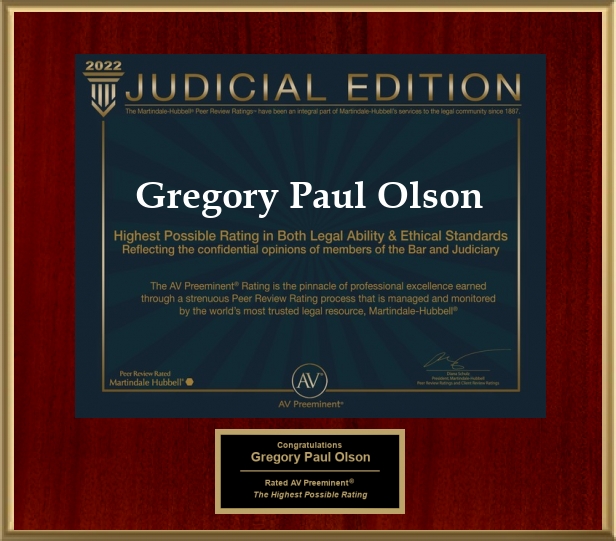Trade Secrets Law
Trade Secrets Lawyer in
San Diego
The Law Office of Gregory P. Olson, APC establishes and improves trade secret protection policies and procedures for its clients. Our trade secrets attorney in San Diego negotiates and drafts non-disclosure and confidentiality agreements for various situations including employment, independent contractors and vendors.
The Uniform Trade Secrets Act (“UTSA”) is the legal framework for the protection of business trade secrets. The law defines a trade secret as, “information, including a formula, pattern, compilation, program, device, method, technique, or process that:
- Derives independent economic value, actual or potential from not being general known to or readily ascertainable through appropriate means by other persons who might obtain economic value from its disclosure or use; and
- Subject of efforts that are reasonable under the circumstances to maintain its secrecy.”
Establishing a Trade Secret Claim
In order to establish a trade secret claim, a business must establish three things:
1
The “secret” involved qualifies for trade secret protection, as in it must be the type of information trade secret law was intended to protect and it cannot be generally known
2
The business must show that reasonable measures were taken to protect this information
3
The business must establish that the information was misappropriated/wrongfully acquired by another
While misappropriation of trade secrets is punishable by law, use of another’s trade secret is not automatically a violation of the UTSA. Unlawful misappropriation of trade secrets occurs in two situations:
1
Where the trade secret is acquired through improper means
2
Where the situation involves a breach of confidence
There are situations where acquisition of trade secrets is lawful, such as through independent discovery or when a company does not take reasonable measures in protecting their trade secrets.
The Law Office of Gregory P. Olson, APC understands the importance of business trade secrets and how vital protecting those trade secrets is to our business clients. Our San Diego trade secrets attorney, Mr. Olson is well-versed in trade secret law and understands the minute details of the UTSA, as well as the best strategies for obtaining a successful outcome in a trade secret case.
Examples of Trade Secrets
Many things can qualify as a trade secret under the legal definition. Customer lists, where contact information is included, are considered a “trade secret” if that list cannot be easily ascertained from commonly available sources. Manufacturing details can also be protected under the UTSA, if those details are not publicly available and companies make reasonable efforts to protect them.
Gregory Olson has worked on many trade secret cases. Previously, Mr. Olson represented a company that developed proprietary software for its health care industry customers. A competitor unlawfully obtained an unlicensed copy of the software, and used it to obtain a competitive advantage in the marketplace. Mr. Olson brought the case before the Superior Court of California, and prosecuted claims for breach of contract, intentional interference with contract, and misappropriation of trade secrets. He successfully obtained money damages for his client, as well as an injunction against the competitor and other defendants.
Mr. Olson has worked on trade secret matters in a variety of industries such as biotech, manufacturing, insurance, government contracts and defense, medical, health care and others.
The Law Office of Gregory P. Olson, APC frequently handles litigation in both federal and state courts that may often be associated with the loss or hiring of employees in conjunction with the unauthorized transfer of trade secrets, customers or other employees. The firm evaluates the viability of claims under the USTA and confidentiality or non-disclosure agreements, and drafts “cease and desist” letters and, if appropriate, obtains temporary restraining orders and preliminary injunctions required to protect against the unlawful use of protectable trade secrets.

Trade Secret Lawyer Frequently Asked Questions:
What is a trade secret?
A trade secret is any valuable confidential business information that provides a competitive advantage. This can include formulas, patterns, compilations, programs, devices, methods, techniques, or processes. In California, the information must be subject to reasonable efforts to maintain its secrecy.
How do I know if my information qualifies as a trade secret?
To qualify as a trade secret, the information must:
- Not be generally known or readily ascertainable
- Provide economic value from not being publicly known
- Be subject to reasonable efforts to maintain its secrecy
There may be significant hurdles in proving the existence of a trade secret. A plaintiff will often present evidence of a written nondisclosure agreement to establish that information being shared between the parties is not generally known or readily ascertainable, is valuable and is subject to reasonable efforts to maintain secrecy. Analysis of whether or not a trade secret exists is often very dependent on the specific facts of the particular case and industry. The defense will often assert that the trade secret at issue is not really a trade secret at all because the alleged trade secret is generally known and readily ascertainable in the industry. Under certain circumstances, expert witness testimony may be used during depositions or trial regarding the specific nature and details pertaining to the trade secrets at issue.
What is trade secret misappropriation?
Trade secret misappropriation occurs when someone acquires, discloses, or uses a trade secret without the owner’s consent. This can happen through theft, bribery, breach of contract, or other means. A common example is when an employee copies digital files of information meeting the definition of a trade secret without the consent of the employer and uses the information for a purpose not authorized by the employer or former employer.
What are the remedies for trade secret misappropriation?
If your trade secrets are misappropriated, you can seek various remedies, including:
- Injunctive relief (court order to stop the misappropriation)
- Monetary damages (compensation for financial losses)
- Attorney’s fees (in certain cases)
How do I prove trade secret misappropriation?
To prove misappropriation, you must show:
- You owned a valid trade secret
- The defendant acquired, disclosed, or used the trade secret without your consent
- You suffered harm as a result
Proof of the existence of a valid and protectible trade secret at trial is usually presented via live witness testimony and introduction and admission of key documents. For pretrial hearing such as motions for a preliminary injunction, evidence is usually presented by submitting witness declarations sworn to under penalty of perjury and by submission of key documents establishing the requisite elements of a trade secret claim. If certain conditions are met, the court may provide the parties with a protective order so that the trade secrets are not revealed in public court records.
What is the Defend Trade Secrets Act (DTSA)?
The DTSA is a federal law that provides a uniform standard for trade secret protection and allows you to file a lawsuit in federal court for trade secret misappropriation.
Key Provisions of the DTSA
Definition of Trade Secrets: The DTSA adopts a broad definition of trade secrets, encompassing information that derives independent economic value from not being generally known or readily ascertainable and is subject to reasonable efforts to maintain its secrecy.
Civil Seizure Provision: In cases of extraordinary circumstances, the DTSA allows for the ex parte seizure of property to prevent the dissemination of stolen trade secrets. This provision offers businesses a powerful tool to protect their valuable information.
Remedies: The DTSA provides for a range of remedies, including injunctive relief, damages for actual loss, unjust enrichment, or a reasonable royalty, as well as exemplary damages in cases of willful and malicious misappropriation.
Whistleblower Immunity: The DTSA immunizes individuals from civil or criminal liability, under both federal and state law, for certain confidential disclosures of trade secret information (and requires employers to provide employees, contractors, and consultants notice of such immunities).
For businesses operating in California, the DTSA may offer several advantages:
Access to Federal Courts: The DTSA states that the “district courts of the United States shall have original jurisdiction of civil actions brought under the act” and thus offers a plaintiff a forum that may be perceived as more impartial or advantageous in certain cases.
Consistency and Uniformity: By establishing a federal standard for trade secret protection, the DTSA promotes consistency and uniformity in adjudicating trade secret disputes across different states and jurisdictions.
Enhanced Remedies: The remedies available under the DTSA, including the possibility of civil seizure and exemplary damages, provide businesses with potent enforcement mechanisms to deter trade secret misappropriation and seek redress for damages incurred.
The DTSA does not preempt existing state laws. In California, the DTSA complements state law, providing businesses with a comprehensive framework for safeguarding their proprietary information.
How long do I have to file a trade secret lawsuit in California?
In California, the statute of limitations for trade secret misappropriation is 3 years from the date you discovered or reasonably should have discovered the misappropriation.
What are some common defenses to trade secret misappropriation claims?
Common defenses include:
- The information was not a trade secret
- The defendant independently developed the information
- The plaintiff failed to take reasonable steps to protect the secrecy of the information
How can I protect my trade secrets?
Implement a comprehensive trade secret protection program, including:
- Identify and label trade secrets
- Use confidentiality agreements and non-disclosure agreements (NDAs)
- Limit access to trade secrets
- Implement physical and electronic security measures
- Train employees on trade secret protection
Why should I hire a San Diego trade secrets lawyer?
A San Diego trade secrets lawyer can:
- Help you identify and protect your trade secrets
- Advise you on compliance with state and federal laws
- Represent you in trade secret litigation
- Negotiate settlements on your behalf
Awards
Awards for very high ratings in both legal ability & ethical standards





